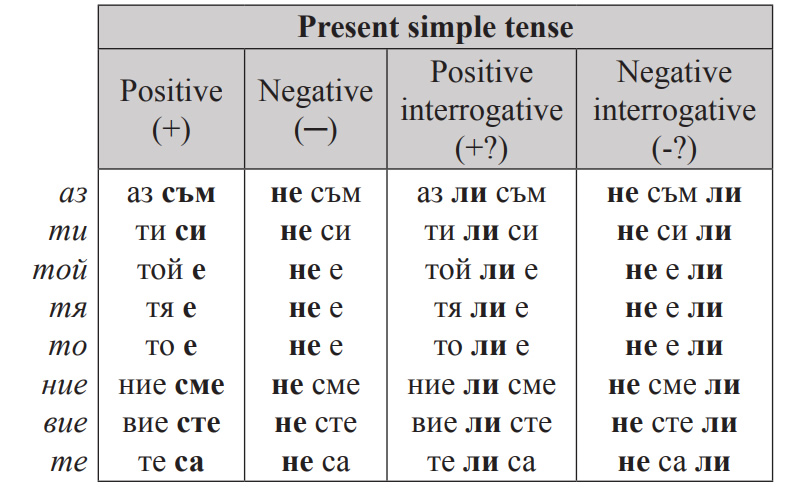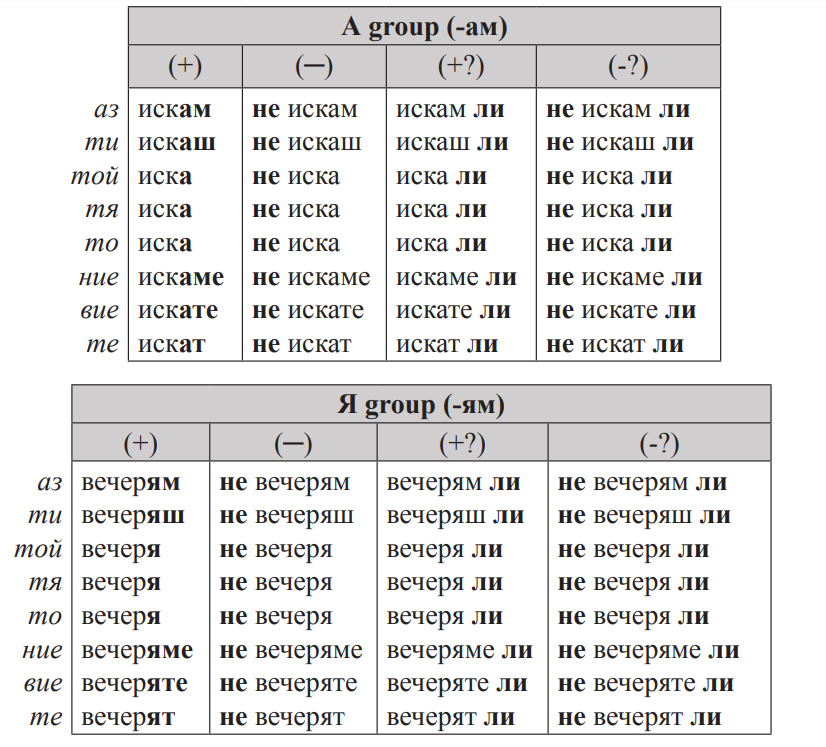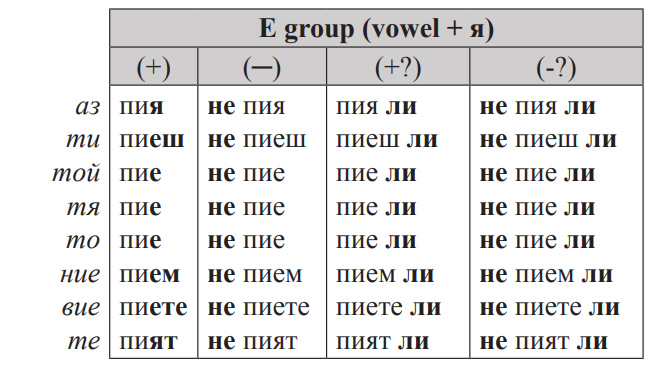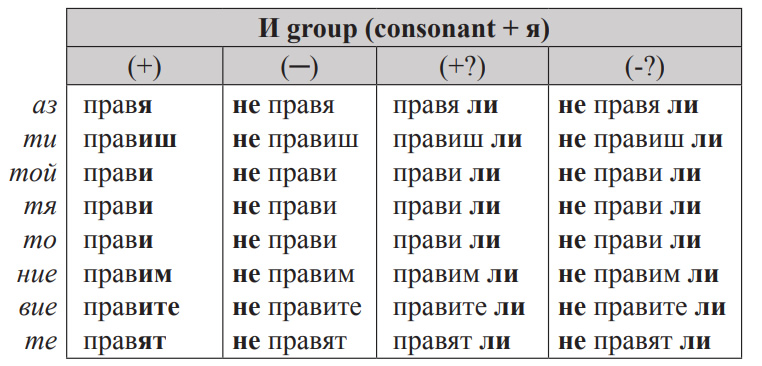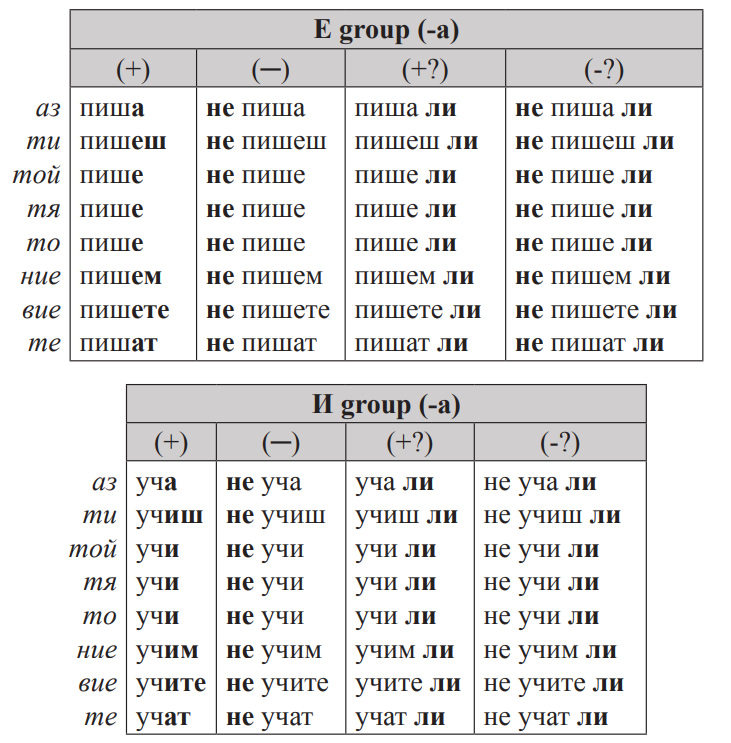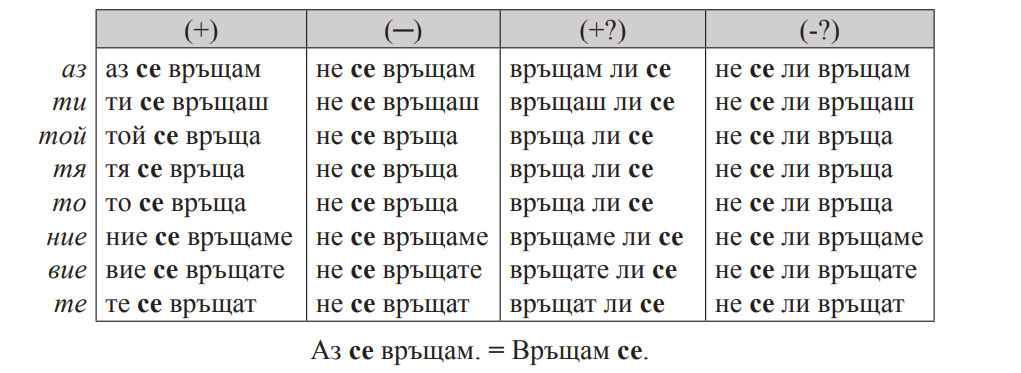Difference between revisions of "Language/Bulgarian/Grammar/PRESENT-SIMPLE-TENSE-–-Сегашно-време"
(Created page with "thumb <div style="font-size:300%"> PRESENT SIMPLE TENSE* – Сегашно време </div> * <small>The name of the tense is...") |
|||
| Line 8: | Line 8: | ||
==3 persons== | |||
Verbs in Bulgarian have three persons – 1st, 2nd, and 3rd – and two numbers – singular and plural. | |||
==No infinitive form== | |||
Verbs in Bulgarian do not have an infinitive form. Therefore the 1st person singular in present simple tense is used as a basic form of the verb. | |||
==Irregular verb "to be"== | |||
The present simple tense of the verb “to be” is formed in an irregular way. | |||
[[File:Bulgarian-Language-Present-Tense1-PolyglotClub.jpg]] | [[File:Bulgarian-Language-Present-Tense1-PolyglotClub.jpg]] | ||
==3 groups or conjugations of verbs== | |||
There are three groups or conjugations of verbs in the Bulgarian language: A/Я group (3rd conjugation), E group (1st conjugation), and И group (2nd conjugation). | |||
==Skip the personal pronouns== | |||
We often skip the personal pronouns, as the grammatical person and number are clear by the form of the verb. | |||
==3rd conjugation== | |||
A/Я group (3rd conjugation) – All the verbs from the A/Я group end in -АМ/-ЯМ in 1st person singular. | |||
| Line 37: | Line 37: | ||
Some verbs from this group are: вечерям, забравям, закусвам, затварям, искам, казвам, казвам се, купувам, обичам, харесвам, обядвам, отварям, отговарям, отивам, разбирам. | |||
==1st conjugation== | |||
E group (1st conjugation) – Many of the verbs from the Е group end in a vowel + Я in 1st person singular. | |||
| Line 48: | Line 49: | ||
Some verbs from this group are: желая, зная/знам, играя, мечтая, мия (се), мога, пея, пия, пиша, смея се, чета. Exception: ям – аз ям, ти ядеш, той/тя/ то яде, ние ядем, вие ядете, те ядат. | |||
==2nd conjugation== | |||
И group (2nd conjugation) – Almost all of the verbs from the И group end in a consonant + Я in 1st person singular. | |||
| Line 60: | Line 60: | ||
Some verbs from this group are: вървя, говоря, готвя, каня, мисля, моля, мълча, правя, работя, свиря, търся, уча, ходя. | |||
==Verbs ending in consonant + A in 1st person singular== | |||
Verbs ending in consonant + A in 1st person singular belong either to E group or to И group. | |||
| Line 72: | Line 72: | ||
==placement of the reflexive pronoun CE== | |||
Pay attention to the placement of the reflexive pronoun CE. | |||
| Line 80: | Line 80: | ||
==When do we use simple tense?== | |||
We use present simple tense to talk about: | |||
* a fact | * a fact | ||
* a habit or repeated action | * a habit or repeated action | ||
| Line 87: | Line 87: | ||
==Used with adverbs of frequency== | |||
Present simple tense is often used with adverbs of frequency: винаги, обикновено, често, понякога, рядко, никога | |||
Revision as of 10:36, 1 November 2021
- The name of the tense is Bulgarian is Present Tense but Present Simple Tense is the closest corresponding English tense to it.
3 persons
Verbs in Bulgarian have three persons – 1st, 2nd, and 3rd – and two numbers – singular and plural.
No infinitive form
Verbs in Bulgarian do not have an infinitive form. Therefore the 1st person singular in present simple tense is used as a basic form of the verb.
Irregular verb "to be"
The present simple tense of the verb “to be” is formed in an irregular way.
3 groups or conjugations of verbs
There are three groups or conjugations of verbs in the Bulgarian language: A/Я group (3rd conjugation), E group (1st conjugation), and И group (2nd conjugation).
Skip the personal pronouns
We often skip the personal pronouns, as the grammatical person and number are clear by the form of the verb.
3rd conjugation
A/Я group (3rd conjugation) – All the verbs from the A/Я group end in -АМ/-ЯМ in 1st person singular.
Some verbs from this group are: вечерям, забравям, закусвам, затварям, искам, казвам, казвам се, купувам, обичам, харесвам, обядвам, отварям, отговарям, отивам, разбирам.
1st conjugation
E group (1st conjugation) – Many of the verbs from the Е group end in a vowel + Я in 1st person singular.
Some verbs from this group are: желая, зная/знам, играя, мечтая, мия (се), мога, пея, пия, пиша, смея се, чета. Exception: ям – аз ям, ти ядеш, той/тя/ то яде, ние ядем, вие ядете, те ядат.
2nd conjugation
И group (2nd conjugation) – Almost all of the verbs from the И group end in a consonant + Я in 1st person singular.
Some verbs from this group are: вървя, говоря, готвя, каня, мисля, моля, мълча, правя, работя, свиря, търся, уча, ходя.
Verbs ending in consonant + A in 1st person singular
Verbs ending in consonant + A in 1st person singular belong either to E group or to И group.
placement of the reflexive pronoun CE
Pay attention to the placement of the reflexive pronoun CE.
When do we use simple tense?
We use present simple tense to talk about:
- a fact
- a habit or repeated action
- an activity happening now
Used with adverbs of frequency
Present simple tense is often used with adverbs of frequency: винаги, обикновено, често, понякога, рядко, никога
Videos
Present Simple Tense - Сегашно просто време
Questions in the Present Tense - Въпроси в сегашно време ...

